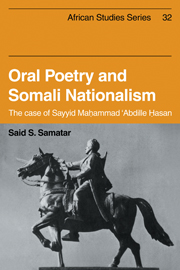Book contents
- Frontmatter
- Contents
- List of illustrations
- List of figures
- List of tables
- Note on transcription of Somali words
- Preface
- Introduction
- 1 Elements of Somali pastoral oratory: Prose
- 2 Elements of Somali pastoral oratory: Poetry
- 3 Occupation and resistance: The rise of the Somali Dervishes
- 4 Poetic oratory and the Dervish movement
- 5 Myth and the Mullah
- Notes
- Select bibliography
- Index
- Titles in the series
4 - Poetic oratory and the Dervish movement
Published online by Cambridge University Press: 07 May 2010
- Frontmatter
- Contents
- List of illustrations
- List of figures
- List of tables
- Note on transcription of Somali words
- Preface
- Introduction
- 1 Elements of Somali pastoral oratory: Prose
- 2 Elements of Somali pastoral oratory: Poetry
- 3 Occupation and resistance: The rise of the Somali Dervishes
- 4 Poetic oratory and the Dervish movement
- 5 Myth and the Mullah
- Notes
- Select bibliography
- Index
- Titles in the series
Summary
MAḤAMMAD ʿABDILLE ḤASAN: THE POLITICAL ORATOR
During the twenty-year period of Dervish fighting for independence, Maḥammad ʿA. Ḥasan produced the works of poetry which have won for him the reputation of being the greatest Somali poet. By any standard the Sayyid could be judged an artist of great power and by Somali standards as something of a literary master. There is an element of paradox in this observation, as indeed in many other features of Sayyid Maḥammad's complex, at times contradictory, life. Although he lived to be ‘one of the greatest Somalis of words’ (Somalis speak of ‘a man of words’ (nin hadal) as opposed to one ‘of letters’, thereby emphasizing the oral character of their verse), there is no record of his having ever composed a word of political poetry until he was a middle-aged man, well into his forties. Indigenous sources hold unanimously that the Sayyid's first Somali poems date from 1904, nearly six years from the inception of the Dervish movement; that a great many of his serious poems were composed between 1905 and 1909, when the Dervishes had settled between Illig and Eyle on the eastern Somali coast between the Majeerteen and Hobyo (Obbia) sultanates. This is not to say that political poetry was not of importance to the Dervish cause before this time. As I hope to demonstrate shortly, high-powered propaganda warfare conducted through the medium of political poetry was a salient feature of the conflict from its early days, and it was utilized by both the Dervishes and their enemies in their fight for the allegiance of the Somali people.
- Type
- Chapter
- Information
- Oral Poetry and Somali NationalismThe Case of Sayid Mahammad 'Abdille Hasan, pp. 137 - 181Publisher: Cambridge University PressPrint publication year: 1982

